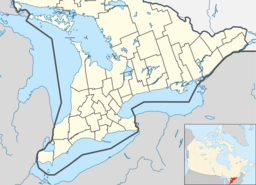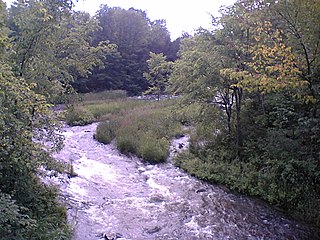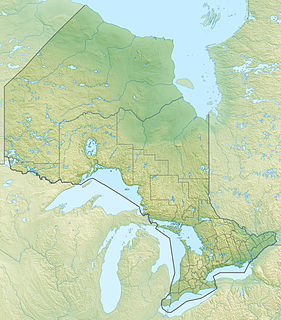| North York River | |
| Country | Canada |
|---|---|
| Province | Ontario |
| Region | Central Ontario |
| County | Haliburton |
| Municipality | Highlands East |
| Part of | Great Lakes Basin |
| Source | Little Branch Lake |
| - elevation | 416 m (1,365 ft) |
| - coordinates | 45°18′10″N78°13′34″W / 45.30278°N 78.22611°W |
| Mouth | York River |
| - elevation | 394 m (1,293 ft) |
| - coordinates | 45°14′24″N78°14′12″W / 45.24000°N 78.23667°W Coordinates: 45°14′24″N78°14′12″W / 45.24000°N 78.23667°W |
The North York River is a river in the municipality of Dysart et al, Haliburton County in Central Ontario, Canada. [1] It is in the southern extension of Algonquin Provincial Park, is in the Saint Lawrence River drainage basin, and is a left tributary of the York River.

A river is a natural flowing watercourse, usually freshwater, flowing towards an ocean, sea, lake or another river. In some cases a river flows into the ground and becomes dry at the end of its course without reaching another body of water. Small rivers can be referred to using names such as stream, creek, brook, rivulet, and rill. There are no official definitions for the generic term river as applied to geographic features, although in some countries or communities a stream is defined by its size. Many names for small rivers are specific to geographic location; examples are "run" in some parts of the United States, "burn" in Scotland and northeast England, and "beck" in northern England. Sometimes a river is defined as being larger than a creek, but not always: the language is vague.

The United Townships of Dysart, Dudley, Harcourt, Guilford, Harburn, Bruton, Havelock, Eyre and Clyde, commonly known as the Municipality of Dysart et al, is a municipality in Haliburton County in Central Ontario, Canada. The original townships were of the Canadian Land and Emigration Company. At 61 letters or 68 non-space characters, the municipality has the longest name of any place in Canada.

Haliburton is a county of Ontario, Canada, known as a tourist and cottage area in Central Ontario for its scenery and for its resident artists. Minden Hills is the county seat. Haliburton County and the village of Haliburton are named after Thomas Chandler Haliburton, author, statesman, and the first chairman of the Canadian Land and Emigration Company.
Contents
The river originates at Little Branch Lake in geographic Clyde Township. It flows southeast, south and west to Billings Lake in geographic Bruton Township. The river then heads south and reaches the York River just upstream of Branch Lake. The York River flows via the Madawaska River and Ottawa River to the Saint Lawrence River.
Little Branch Lake is a lake in Haliburton County, Ontario, Canada in the southern extension of Algonquin Park and is the source of the North York River.
Branch Lake is a lake in Haliburton County, Ontario, Canada in the southern extension of Algonquin Park. The York River flows into and exits from the lake. The North York River joins the York River at the lake.

The Madawaska River is a river in the Saint Lawrence River drainage basin in Ontario, Canada. The river is 230 km (143 mi) long and drains an area of 8,470 km2 (3,270 sq mi). Its name comes from an Algonquian band of the region known as "Matouweskarini", meaning "people of the shallows".










